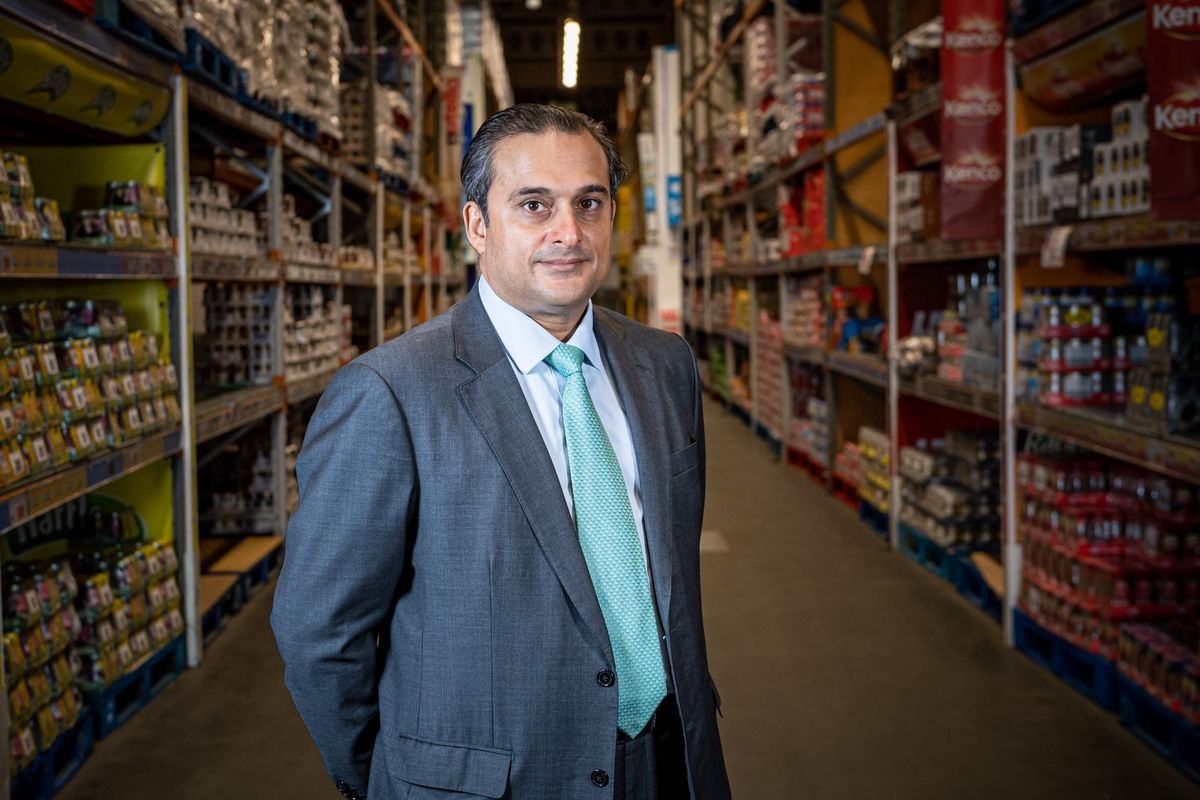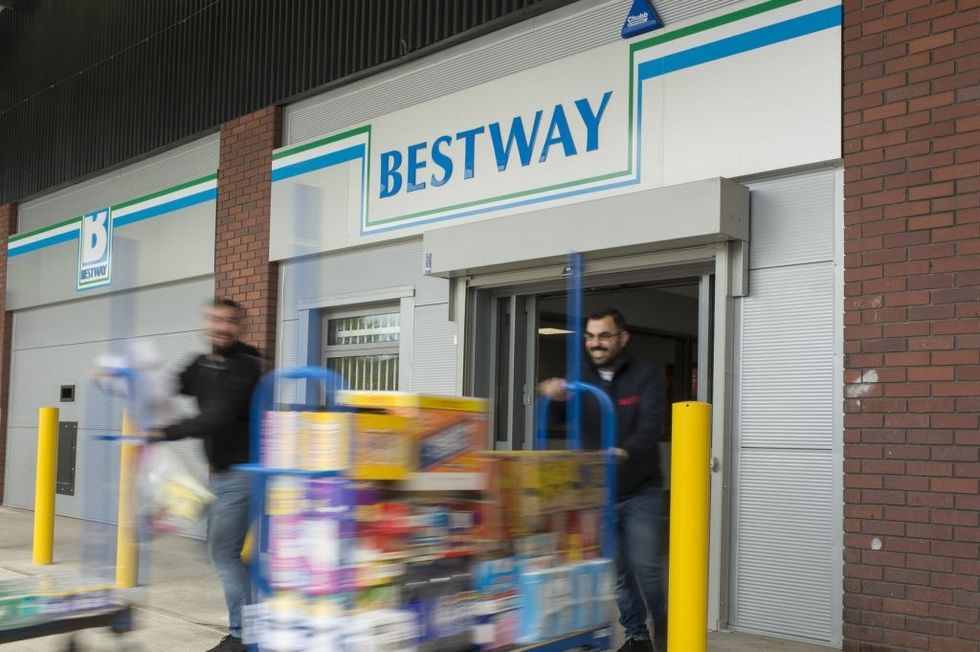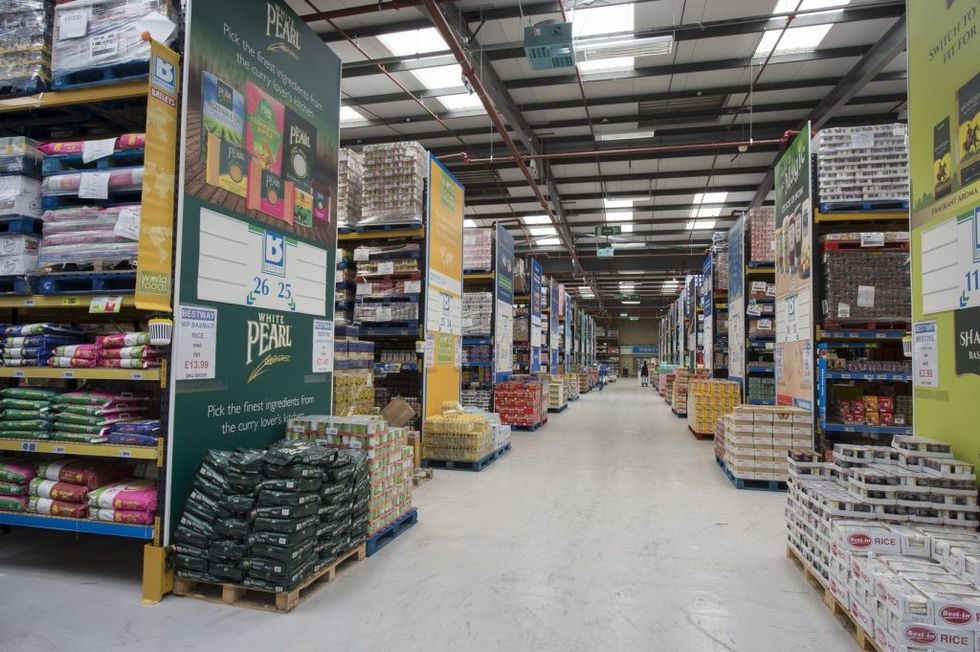Where are we, exactly? I ask. Even living in London and understanding it fairly well, the jumble of flyovers, aprons and railheads in this neck of the woods remains a bit disorientating.
“Park Royal,” answers Dawood Pervez, MD of Bestway Wholesale, one of the biggest and most successful family-owned businesses in the country. “This is the end of Park Royal. Over the other side is Stonebridge Park. You cross over that railway line and it’s Harlesden. And you cross over the other way, it’s Wembley.”
We are in his office on an upper floor of the massive Bestway Park Royal depot, separate and away from the busy commotion down below on the shop-floor. Bestway has come a long way from its origins as a small chain of corner shops in the 1960s, and on the other hand it literally hasn’t come a long way at all – the original cash and carry depot was opened 45 years ago in Acton, slightly to the west of where we are today.
Of course Bestway is now an international organisation, with huge interests in Pakistan for example, where its banking and cement industries help to maintain that country’s balance of payments account. In addition to banking and cement and of course wholesale, Bestway is now in petcare, pharmacies, retail, property and all manner of other enterprises, and has a multi-billion pound annual turnover.
The company CEO is the recently ennobled Zameer Choudrey (Dawood’s first cousin), and Dawood’s father Bestway founder Sir Anwar, was knighted as far back as 1999, an honour that followed his earlier OBE.
This is a company that is very much appreciated by the UK establishment – but even more appreciated by those it was set up to help and even rescue: Britain’s small, independent shop-keepers. Most of them, like Sir Anwar, had arrived in this country from South Asia or later from Kenya, following Jomo Kenyatta’s “Africanisation” of the country, and then from Uganda, fleeing the dictator Idi Amin.
We are here to talk about how far Bestway has come, and how it was done, as the company closes in on the half-century marker. Dawood is particularly proud of the good that Bestway has accomplished – and is increasingly adding to – via major charitable foundations in the UK and in Pakistan. But he is also very keen to stress the role that Bestway played in the history of “his” people, the shopkeepers, who migrated here and then prospered with Bestway’s help. And it was essential help, as Dawood explains.
“The point is,” he says, “if Bestway or Sir Anwar Pervez, or Younus Sheikh, hadn’t done what they did, we wouldn’t see the diversity of culture that remains to this day across the entrepreneurial convenience store sector. It was the start of a very big movement in the UK.”
It seems on the face of it a bold claim for a single enterprise to make, but it is essentially true. The late 1960s and early 1970s was a period of modernization and change in UK grocery, with many of the small supermarket chains being gobbled up by the emerging giants we know today.
Wholesale margins at the time were high, 10-12%, retail profits wafer-thin, and it seemed as if grocery stores could survive only by scaling up.
This made being an indie at the time a precarious and ill-starred career-choice, because the tiny margins indies could charge were on the knife-edge of being ruinous. Sir Anwar was acutely aware of this as a storeowner himself (of around 11 shops by the time he opened his first cash and carry) and had the insight that he could supply the sector he knew very well – ethnic-food stores in the first instance – a lot more cheaply than the existing wholesalers.
“Back then there was a different model in the market,” explains Dawood. “You had a wholesaler but you also had manufacturers with massive van sales operations, with lots of deliveries to every single convenience store: highly inefficient. So my father thought, ‘wouldn’t it be amazing if I could just open a cash and carrier depot and I could service my shops, give them a fair price, good availability, and also maybe get some of the wider community to come in.”
Sir Anwar’s revolutionary act – and “revolution” is the right word, as it was in effect a political act on behalf of small storeowners – was to slash his wholesale margin to around three per cent, with the confidence that he could still make a profit by knowing his market and being super-efficient.
Wholesaler margins might go down, but volume would go up, up, up.
“So when [Bestway] opened its doors in 1976, the pricing was fantastic, and it was a runaway success because lots of retailers – who are businessmen – could see the benefits of shopping there. Not only that, there was a retailer looking after them; someone who had experience running shops and knew what shopkeepers wanted, knew how they thought, providing them with a service to stock their shelves.”
It transformed the fortunes of “Bestway’s customers” who were overwhelmingly Asians, recently arrived in the UK at that time.
“Why were they [the immigrants] in independent stores to start with?” Dawood asks rhetorically. “It was because it wasn’t easy for them to get jobs employed by other people. Because the world was unfair. They were highly educated. In Uganda they were running car dealerships, or were engineers, school teachers or even doctors, and they ended up running corner shops here because they couldn’t get good jobs.”
The East African Asians had arrived in the UK often penniless after having had their businesses frozen or plundered, and now faced financial and social barriers on a cold and rainy island. They were attracted to convenience by the limited capital required to establish a small store and keep it stocked. It was a business they could start off in and then branch out from – although many happily remain there to this day, enjoying their independence.
“It was because Bestway was there to welcome them, to give them the product at the right price, with good availability, that they were able to establish themselves,” says Dawood. “And if you look at that cohort of people, they’ve gone on and become a vital part of their local community’ life. Bestway is all about supporting these independent retailers.”
This aspect probably remains strictly local knowledge (although Margaret Thatcher appeared to have appreciated what Sir Anwar had done), but it means that Bestway has a special place in the culture and history of the convenience channel, and I suggest to Dawood that without Bestway, the country would not have the sector as it is today, and that it would be much smaller and insignificant had Bestway not been there in the early days.
“There’s a lot of love for Bestway out there and this goes back 45 years,” he admits. “They’re not necessarily people who are in the sector anymore. They might be working at Barclays or, you know, they might be opticians, or dentists, but they remember that their parents used to go to Bestway. This is the business that gave a lot of them the opportunity to establish themselves and get a great job and income. And importantly, respect.”
The path to now
Two compelling elements of the Bestway story are these: first, how did something so small grow into something so big? That is an important business journey full of salutary lessons well worth learning.
Second, how has Bestway managed to stay a family concern and resist the urge to cash out and allow a bigger, perhaps a public company, to take over at some point?
“I think it was Sir Anwar’s desire to keep growing,” says Dawood simply. “The first depot in Acton would have been ‘success’ for a of people. But of course he wanted to keep pushing and keep going. He thought, ‘If I can do it well in Acton then I can do well in other locations.’
“So, the second depot came, then the third depot, and then Sir Anwar realized that the business was onto something that was replicable, repeatable, and could be scaled. Which is what he did.”
This was the period when the small family concern began to appear on the national radar as a significant and growing entity – did it feel like clinging to the tail of a tiger at the time?
“From the outside it looked like it was phenomenally fast,” says Dawood. “But from the inside the business was set up and managed by Sir Anwar to grow. It grew at the rate of one or two depots a year and that turned into the norm! It was only in the nineties that we started to ask, ‘How do we diversify? What should we do as well? Should we do everything just in wholesale or shall we look at different business areas? Do we invest in some properties or whatever else?’”
The first major diversification was rice milling. They had never milled rice before, but it was tangentially aligned to the business. “It is still ongoing, with our rice mill here in Park Royal, and there’s one over in Pakistan as well importing basmati rice under the White Pearl brand,” says Dawood.
The next diversification was truly different, though: cement manufacture in Pakistan. They knew nothing of the cement business but the entrepreneurial spirit of Sir Anwar, together with the energy and drive of Lord Choudrey, brought to bear on the venture. Bestway Cement is now the largest cement manufacture in Pakistan.
Banking followed in Pakistan, enabling millions of people to be hooked up to the financial system for the first time, allowing credit for investment, security and prosperity. And through UBL Omni, Bestway was able to give the ability to local stores in Pakistan to operate for a bank for a few hours per day in rural locations providing banking services that people had never been able to access before.
It’s clear that Bestway is not afraid of diversifying into new lines of business as 2014 saw the company enter into the pharmacy business with the acquisition of Co-op Pharmacy, now branded Well Pharmacy.
And then the charitable works began off the back of Bestway’s success, first in the UK, with the Bestway Foundation established in 1987, and then a sister organisation in Pakistan established in 1997. “It is something that my father strongly believes in that is imbedded in the heart of our business,” Dawood says. “It’s a fundamental tenet is that we should support those less fortunate than ourselves, and we should support the communities in which we operate. I suppose it comes from the concept of Zakat in Islam, which is where you give a certain percentage of your income to charitable purposes.”
The Foundation is primarily focused on education, but healthcare as well.
“To date, we’ve given in excess of $42 million to charitable purposes. We’ve provided health care to over 35,000 patients. There’s over 10,000 people that have been provided training by the Bestway Group there and in the UK. Over 1000 students have had scholarships provided to them.”
It is a fine way for Sir Anwar to give back to the country he left in the 1950s to make a life here in the UK, which started humbly as a bus conductor.
Dawood was just an infant when the Acton depot first opened. “But I do have memories of the early years, when I was a young boy”, he says. “I used to visit the depot in Acton and see my father and Younus Sheikh, back in the day, working really hard, really long hours, seven days a week, doing everything from negotiating to receiving goods, to putting those goods away, meeting and dealing with customers. It was 100 per cent all-consuming for them in the early days.”
After Eton and Oxford Dawood trained as a solicitor, working in mergers and acquisitions before returning to the family firm, and his professional success in the outside world was probably the perfect grounding for success in-house.
The road ahead
Dawood’s telling of the story of where Bestway started relates to where it is headed now, especially after so much change in the role of the channel during the pandemic.
“If you look at the 45,000 independent retailers, it’s a key feature in the UK that you’ve got this amazing convenience network. I place it along with pubs, footpaths and bridleways, things that are uniquely British that we will take for granted living here, but actually provide enormous utility and benefit to people and their way of life.
“Convenience stores have been unpaid social workers for decades, looking after people in their communities, being aware of those who are vulnerable and making sure that they’re okay, sacrificing their own wellbeing to some degree, working unbelievable hours to provide that service to the communities they serve. It’s truly inspirational. And of course, Bestway’s role is to serve them and help them make more possible,” he says.
What has really “shaken the box” and changed how convenience stores are perceived, has been the pandemic and lockdown. It thrust convenience into a new role despite being sidelined by producers during the initial period of panic-buying. Dawood believes the channel has come out ahead because consumers have really seen the value, the commitment and the support given to them by their local convenience store – at a time when the government said ‘stay local’ so that is what consumers did. This is an image of the future in grocery retail.
“If we look at the UK grocery sector on the whole, the largest lump of volume in the overall market sits with multiple retailers. Tesco itself is a £50 billion turnover business, and that’s just one of them,” said Dawood. “But convenience is showing the highest growth rates, so it’s outperforming the multiples and what’s clear is the position the channel’s in now versus 2019 is improved. There’s more wind in the sails.”

He thinks that people enjoy the benefit and utility of having a good local store and no longer simply use them for “distress purchases” (“I hate that phrase,” he sighs).
“Increasingly, people now go there on purpose, they’ve actually planned to go there because actually it suits them, it’s convenient for them and it’s their local store. They no longer want to necessarily do all their shopping for a few weeks in one go, and as online continues to grow in terms of people ordering big baskets online, then they’ll supplement that with local shopping.”
It is an important point that, as Dawood emphasizes, multiples are increasingly relying on customers ordering online for delivery, which is “margin erosive”.
“And as they put all the pressure on their P and L, they can’t necessarily be as different on pricing as they have been traditionally from independent stores. So that creates a better, more level playing field, and don’t let’s forget that independent retail has also seen considerable acceleration in digital and tech to support the changes in consumer’ shopping behaviors. That may be consumers who want to shop online or be rewarded for loyalty or repeat purchases. I’m very hopeful and very positive for the future.”
It is not only convenience stores that will enjoy advantages from the “great reset”, such as it is. The High Street is likely to enjoy a renaissance as a result of the return to local living and the surge in home-working (not to mention the newly acquired aversion to infectious crowds).
“What’s happened with COVID will affect the high street a lot,” says Dawood. “I think retail rents are going to change completely and this will be a massive opportunity for independent stores and entrepreneurs who want to set up locally.”
The discussion around the reform or removal of business rates is relevant, here.
“If the government wanted to encourage grassroots economic activity, one of the best ways is to focus on looking at the business rates system for independent retailers,” says Dawood.
He recalls that after 2002-3 the banks went on a lending spree, leading to the rise of the debt-fueled chains. “Back then, chains were putting down premiums to get hold of stores that they wanted. They were all bidding against each other for key locations.”
That now seems like another world as so many over-leveraged chains have vanished – leaving gaps in the high street that can be filed at cheaper rents. But convenience has to step up to the plate – to adapt a baseball metaphor and turn it into a food-to-go one.
Dawood sees a “Swiss-knife” future for convenience, with brand partnerships and multi-service installations re-making the community store.
“There’s been lots of different partnerships with lots of brand owners – Costa or other coffee companies, or slushy, or nachos, or pizza, or there’s certainly other bolt-ons that you can put into a convenience store,” he says. “I think the owners of those brands are looking at the market and thinking, ‘We can spend a lot of capital and set up our own shops and then have a massive operation running them. Or we could partner with people. Businesses are thinking very differently about how they can grow now. And partnership is definitely an approach.”
He imagines convenience stores as a format that will grow larger in certain locations and be able to provide many more services – many already provide a post office, PayPoint, parcel collection, but what’s to say they can’t provide dry cleaning for example.
“I also think that convenience stores will have a marketplace or an ‘Endless Aisle’ behind them, which they’ll be able to serve up to their consumers within a day or two. So, there’s loads to go for and if anything, the store size is probably going to get larger.”
It’s an opportunity, argues Dawood, for convenience to pick up the ball (back to the baseball metaphor) that it dropped several decades back.
“If you really think about it, convenience stores 20 to 30 years ago had all the key locations and it was almost a failing on the part of us as a channel to capitalise on what was the food-to-go boom. Other new businesses specialised in coffee or sandwiches and opened hundreds of stores. So why couldn’t convenience stores actually provide those to the to the level that’s required? Now,” he concludes, “I think they can.”
Winter … then Spring
“If there’s a recession” – says Dawood, in case there is any doubt about the consequences of the unprecedented debt loaded stacked up during lockdown– “and people are feeling the pinch in their pockets, they’re going to seek value in one of two ways. One is, perhaps they’ll spend less on treating themselves by going out. A lot of people have learned that they can have a pretty good time at home and it will cost them significantly less.”
This, naturally, is good for convenience.
Foodservice will recover somewhat, but Dawood says folks will probably skip starter and dessert (as they did after 2008), and have a drink beforehand and later, transferring spending to home – partly via the convenience channel.
Dawood is full of optimism despite the obvious economic markers, and I ask him how he sees the road ahead for Bestway in particular: “I believe that to get the best prices to convenience retailers, and to drive the most efficiency to address the market for suppliers and manufacturers, you do need a strong Bestway,” he answers.
“And we’re in good health, and there’s an opportunity for us to grow in the foodservice and catering area, cautiously and carefully. We are also the largest specialist pet products wholesaler in the UK. Through our pet business Bestway supplies many bricks and mortar and digital businesses including Pets at Home, eBay, and Amazon to name but a few … We’re learning a lot of good digital skills that way and addressing the digital consumer base that exists out there.”
It sounds as if Bestway is starting to enjoy the flywheel effect (“network externalities” as the wonks call it) of fully integrating physical and web-based operations, the one boosting the other in a positive feedback-loop.
“The more volume that’s coming through here, the better it is for our customers,” says Dawood. “We’re working in partnership with other businesses – for example, Iceland and Poundland. In relation to the The Big Food Warehouses, we’re working in collaboration and sharing our expertise and knowledge in alcohol with them.
“And as I said, I think partnerships will continue. Bestway has an opportunity to become more and more of a platform-style business for its customers, – the Amazon of wholesale, perhaps? – and actually, to some extent, the suppliers are its customers, and so are the outlets, so we’re aware that we’re in the middle, we’ve got the infrastructure, we can get product from manufacturer to businesses, or customers.”
It is true. Bestway has very good infrastructure and six million square feet of floorspace. “And there’s lots of businesses out there that we can integrate into our infrastructure and drive efficiency. Our infrastructure is good enough for three times the turnover we do, and that’s what you need,” Dawood says. “You need intensification of these activities to drive efficiency for the market, for all our customers, including suppliers.”
“You are at the centre of everything. Why would you ever want to leave?” I say in farewell.
“I wouldn’t want to leave,” Dawood fires back, and looks out the window at the busy car park in Park Royal, ever lovely in the afternoon sunshine.
“Last but not least,” he says, “I wish everybody a Happy Diwali.”




